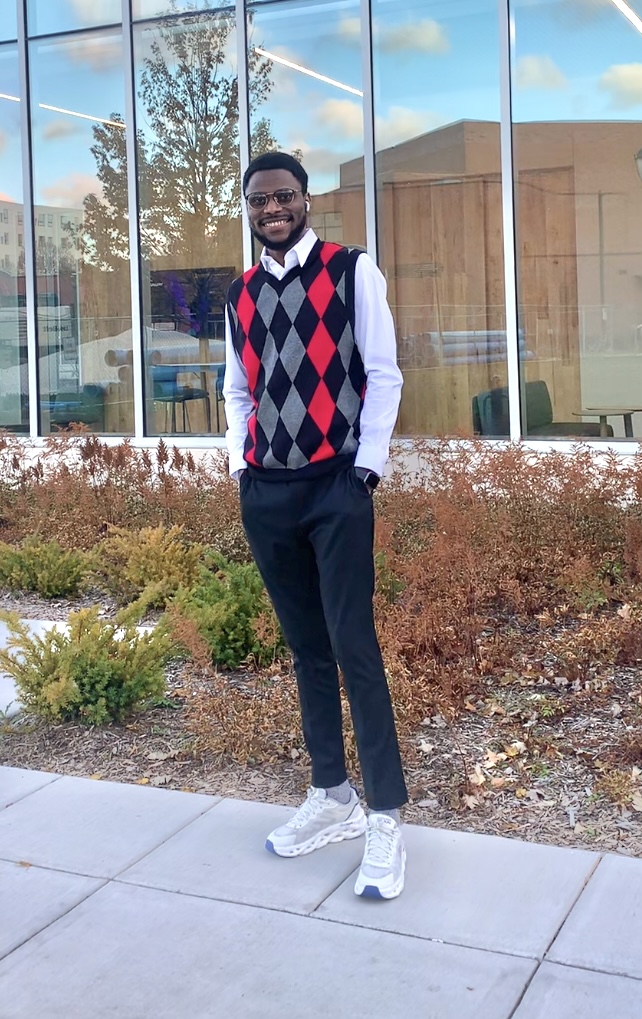
Adebayo Adeleye, is a second-year doctoral student in the Department of Chemistry who was recently awarded a 2024 Graduate Teaching Excellence Award which recognizes teaching assistants who exemplify excellent pedagogical approaches, student engagement, and teaching effectiveness in the classroom. Adebayo also participated in the 2024 Three Minute Thesis (3MT) Competition and qualified as one of the top ten finalists. The Graduate School reached out to Adeleye to ask him to share about his experience preparing and participating in the 3MT.
What interested you in participating in the 3MT?
I was drawn to the 3MT competition because I relished the challenge it presented. Condensing years of complex research into a compelling 180-second pitch for a non-specialist audience is no easy task! Before committing, I asked myself questions such as: Why enter the 3MT competition? Why add another task to my already endless list of things to do as a PhD student? Am I not busy enough with my research as it is? Do I have the time to commit to this endeavor and prepare adequately for it? Nonetheless, I chose to embrace the challenge, recognizing the opportunity it offered to push my boundaries and gain fresh perspectives on my research. I took the leap, and I am so glad that I did.
In preparing for the competition, I took a step back to reflect on the big picture of my research and develop an approach to present it in a way that would resonate with a non-specialist audience. I found myself pondering questions such as: Does my talk convey an engaging narrative? Have I clearly explained the significance and implications of my work? Is the progression of my presentation logical? Have I managed to keep my audience engaged by avoiding technical jargon? And is my talk within the allotted 180 seconds? Considering these factors, I developed a unique storytelling approach. Through repeated practice sessions, my confidence grew, and I became increasingly prepared for the presentation.
Some people may think that 3MT is just for those who are good at public speaking. However, I would argue that this is not necessarily the case. A truly engaging talk has very little to do with being a gifted speaker or having an exciting topic. In my experience, a great talk is primarily the product of hard work. It comes down to practice, more practice, and then even more practice.
Participating in the 3MT was indeed a rewarding experience that allowed me to showcase my research and its implications to a diverse audience, not to mention meeting new friends and expanding my professional network.
What are you researching and what do you hope to accomplish?
My research focuses on the studies of gas hydrates, often described as ice-like structures containing trapped natural gases. Remarkably, the Gulf of Mexico alone harbors vast reserves of methane gas hydrates, estimated to meet the United States’ current consumption rate for an impressive 250 years. This holds immense potential as an energy source.
However, gas hydrate formation can also be problematic, leading to pipeline blockages and posing significant flow assurance and safety challenges in the oil and gas industry. In the face of escalating environmental concerns regarding carbon emissions and global warming, there is growing interest in leveraging hydrate-based technologies for carbon capture and trapping other greenhouse gases.
My work in the Reid group focuses on understanding the conditions for the formation and decomposition of gas hydrates. We have made significant strides in understanding the conditions for the formation and dissociation of both ethylene oxide and propane hydrates and are now extending our research to explore other relevant systems.
The insights garnered from our studies are pivotal for harnessing the potential of gas hydrates as an energy source and devising strategies to mitigate their formation in oil and gas pipelines.
By comprehending the conditions for hydrate formation and dissociation, we aim to develop efficient and controlled methods for gas storage and transport. Ultimately, our research seeks to make a tangible difference in addressing energy challenges while promoting environmental sustainability.
Have you presented your research at any conferences?
Yes, I’ve presented our research at the American Chemical Society’s spring 2024 meeting, one of the world’s largest conferences that attracts thousands of chemists, chemical engineers, academics, students, and other professionals from around the world. I also presented at the 2023 Marquette‘s Celebration of Research Symposium, the 2023 Forward Thinking Research Symposium, the 2024 Graduate School Research Poster Competition, and the 2024 Three Minute Thesis Competition.
When you aren’t busy researching or teaching, what do you like to do for fun?
I enjoy music, especially playing the guitar and drums for my church or with a band. Beyond music, I also love volunteering and exploring new places while immersing myself in diverse cultures.
Want to read similar stories or have a success story to share? Visit Stories of Graduate Student Success to learn more.


